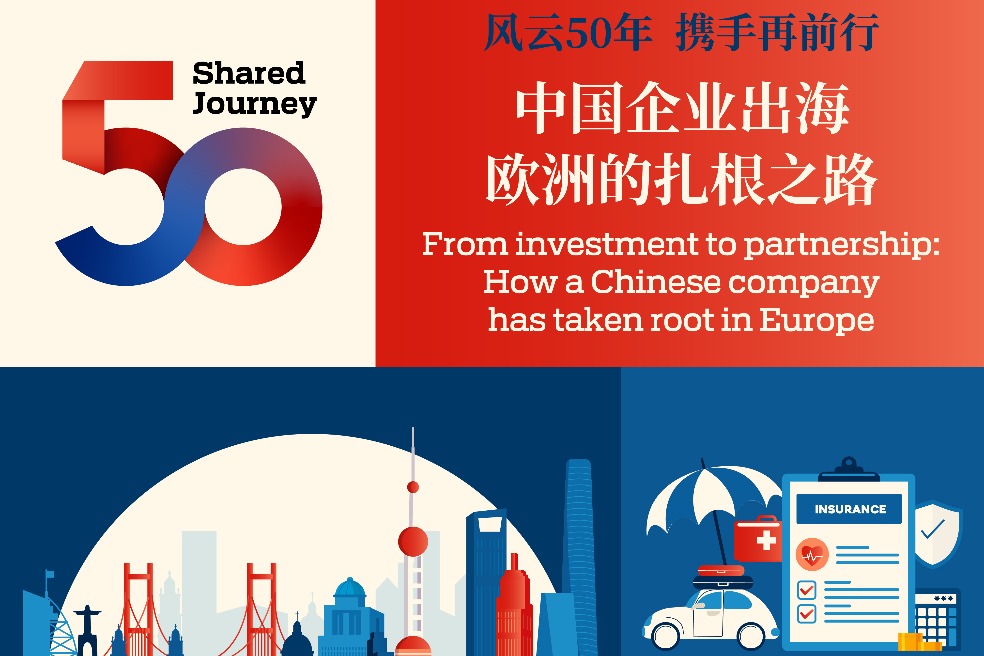Going further to move Sino-US ties forward
By ERIK NILSSON | China Daily | Updated: 2024-03-30 10:00

It was an honor. But in that moment, it was distressing. And it ended with a renewed sense of mission — and hope. Former US secretary of state Henry Kissinger told me during the video interview I was hosting for China Daily's Edgar Snow Newsroom in early 2022: "The basic question between China and the United States seems to me to be this: Through the evolution of our societies, the two nations in the world have the capacity, economically, and by the magnitude of our efforts, to affect the whole world. We also have the technological capacity to produce a maximum degree of good that has never been imagined before but also a degree of devastation that has never been imagined before.
"So, we have a special obligation to do something for which there is no precedent in history, which is the two nations of this magnitude, which usually would wind up in military conflict. Historically, it has led to military conflict. But our leaders on both sides, in both China and in the United States, have to be wise enough to understand that a military conflict between our two nations would bring about a degree of dislocation of the world which would push what we have considered civilization to go back to an earlier beginning."
The phrasing of that last sentence still makes me shudder.
This apprehension is exactly why, Kissinger said, he was talking with us and advocating for this message rather than resting at age 99.
Kissinger worked toward this goal until he passed away at age 100 in November last year.
To look into each other's eyes as he said these words — him, so luminous a statesperson that he's a household name across much of the world and as the person who played a most crucial role in establishing China-US relations — made this existential warning more real and more chilling the destruction we could unleash with a miscalculation, misstep or mistake.
In fact, we did this interview — Kissinger speaking by video call as I hosted the conversation with him and his friend, China's former ambassador to the US, Cui Tiankai — largely because of the way Sino-US relations had been unfolding toward a low point.
To me, helping the world better understand China's realities — especially to improve relations between the country of my birth and my adoptive country — is not just a job but rather a life mission. I was especially honored when Foreign Minister Wang Yi mentioned my mission at the ministry's news conference during the recent two sessions.
This calling is in service of a vision for a world in which we, at least, avoid a devastating conflict and, at best, maximize human betterment. Or, plausibly, we optimize "co-evolution" — the term Kissinger minted to describe his lowercase-i ideal for capital-R Realism in terms of China-US relations across time.
Cui said: "As there, honestly, have been some issues between China and the US, and, more recently, there are very dangerous things coming up, I think we do have a common goal that we are working together to enhance and facilitate mutual understanding between our two countries. If there are problems, we are trying to help to solve these problems."
This was the mood as we commemorated the 50th anniversary of the signing of the Shanghai Communique, which Kissinger helped draft with Chinese officials. It's the foundational document that paved the way for the establishment of China-US diplomatic relations years later.
Days later, in 2022, I attended a ceremony in Shanghai, where Kissinger and leading Chinese officials spoke via video call as well as in-person to commemorate the communique's signing in the exact same room where it took place. Some of us then enjoyed the exact same dishes for lunch in the same restaurant as the leaders and officials did during then US president Richard Nixon's visit. Over the meal, I joined other selected Americans to speak with Chinese officials about how to improve Sino-US relations and mutual understanding.
Also present in the main meeting hall that day, returning exactly half a century later, was Tang Wensheng, a charismatic woman of electric charm, who'd been an interpreter for chairman Mao Zedong and late premier Zhou Enlai during the visits by Kissinger, Nixon and the US table tennis team. She'd also worked with celebrated American journalist Edgar Snow and late Chinese leader Deng Xiaoping, before joining China Daily's editorial board and later working in diplomatic positions, including in the US.
Certainly, I'm encouraged by the November 2023 meeting between the presidents of China and the US. And I fully agree with the Chinese president's statement: "For two large countries like China and the United States, turning their backs on each other is not an option. Planet Earth is big enough for the two countries to succeed."
However, I worry that the recent progress in bilateral ties will encounter more exacting trials as the US revs up for election in November. I've noticed many Chinese friends focus too much on the US presidential election. Actually, most policies, including nearly all related to China, are devised, and passed or struck down, by US Congress.
To slightly oversimplify, the US legislature wields more power than the executive branch and the president who serves as its head. Sure, the US president does exert meaningful influence but more so serves as a figurehead, while Congress decides policies on such propositions as "decoupling", "de-risking", "containment" or even military conflict. The potential US ban on Tik-Tok demonstrates this.
As Kissinger put it during our discussion, "I don't blame either side for the difficulties that appear. In my country, the United States, I argue for understanding and cooperation with the others who have other views. I suspect in China, too, there are people who I have met who have similar overall views. We have to see that the momentary disputes do not overwhelm us. I have not been happy that in recent years the momentary disputes might have taken precedence over the overall objective, and each side should look into itself to see what could be done."
These risks are likely to intensify with the US presidential election this year. The questions are precisely how and what transpires after.
Kissinger continued: "I hope that we will find a way to conduct our conversations. Of course, there'll be some differences, but we should try to resolve them with the understanding that no two countries in history have ever had this opportunity and this capacity. I think a contest between us and China will benefit nobody. There will be no winners … This is a great opportunity and a great danger."
I hope Kissinger's spirit of advocacy for China-US relations lives on after his death. May future generations learn from the wisdom of past generations of diplomats like Kissinger, Cui and Tang.
"History will have its ups and downs. But eventually, it always goes forward. We just have to work for the better because that's in the interest of us all," Tang told me. "The Chinese people want to be friends with other people in the world. They also have to know people who do this work, like yourself, how to explain China to others in a way that can touch their hearts and be truly understood."
We cannot turn our backs to each other. I have seen during my 18 years in China that we as people can stand face to face and hand in hand, see eye to eye and even heart to heart.
I don't know what will happen.
But I do know what could — and should. Most of all, I know what I will do — that is, in every sense, all I can do.
The author is a writer with China Daily.
erik_nilsson@chinadaily.com.cn
























